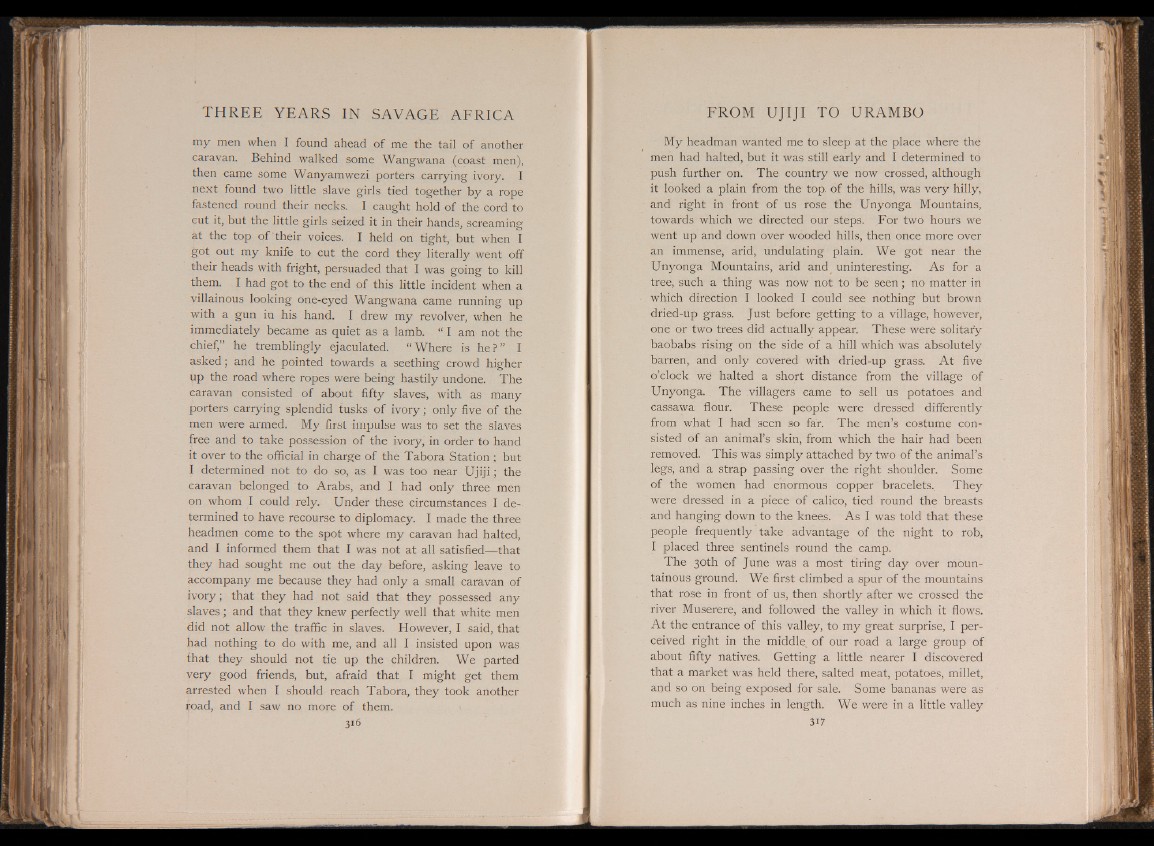
my men when I found ahead of me the tail of another
caravan. Behind walked some Wangwana (coast men),
then came some Wanyamwezi porters carrying ivory. I
next found two little slave girls tied together by a rope
fastened round their necks. I caught hold of the cord to
cut it, but the little girls seized it in their hands, screaming
at the top of their voices. I held on tight, but when I
got out my knife to cut the cord they literally went off
their heads with fright, persuaded that I was going to kill
them. I had got to the end of this little incident when a
villainous looking one-eyed Wangwana came running up
with a gun in his hand. I drew my revolver, when he
immediately became as quiet as a lamb. “ I am not the
chief,” he tremblingly ejaculated. “ Where is he?” I
asked; and he pointed towards a seething crowd higher
up the road where ropes were being hastily undone. The
caravan consisted of about fifty slaves, with as many
porters carrying splendid tusks of ivory; only five of the
men were armed. My first impulse was to set the slaves
free and to take possession of the ivory, in order to hand
it over to the official in charge of the Tabora Station; but
I determined not to do so, as I was too near Ujiji; the
caravan belonged to Arabs, and I had only three men
on whom I could rely. Under these circumstances I determined
to have recourse to diplomacy. I made the three
headmen come to the spot where my caravan had halted,
and I informed them that I was not at all satisfied—that
they had sought me out the day before, asking leave to
accompany me because they had only a small caravan of
ivory; that they had not said that they possessed any
slaves; and that they knew perfectly well that white men
did not allow the traffic in slaves. However, I said, that
had nothing to do with me, and all I insisted upon was
that they should not tie up the children. We parted
very good friends, but, afraid that I might get them
arrested when I should reach Tabora, they took another
road, and I saw no more of them.
316
My headman wanted me to sleep at the place where the
men had halted, but it was still early and I determined to
push further on. The country we now crossed, although
it looked a plain from the top. of the hills, was very hilly,
and right in front of us rose the Unyonga Mountains,
towards which we directed our steps. For two hours we
went up and down over wooded hills, then once more over
an immense, arid, undulating plain. We got near the
Unyonga Mountains, arid and uninteresting. As for a
tree, such a thing was now not to be seen; no matter in
which direction I looked I could see nothing but brown
dried-up grass. Just before getting to a village, however,
one or two trees did actually appear. These were solitary
baobabs rising on the side of a hill which was absolutely
barren, and only covered with dried-up grass. At five
o’clock we halted a short distance from the village of
Unyonga. The villagers came to sell us potatoes and
cassawa flour. These people were dressed differently
from what I had seen so far. The men’s costume consisted
of an animal’s skin, from which the hair had been
removed. This was simply attached by two of the animal’s
legs, and a strap passing over the right shoulder. Some
of the women had enormous copper bracelets.. They
were dressed in a piece of calico, tied round the breasts
and hanging down to the knees. As I was told that these
people frequently take advantage of the night to rob,
I placed three sentinels round the camp.
The 30th of June was a most tiring day over mountainous
ground. We first climbed a spur of the mountains
that rose in front of us, then shortly after we crossed the
river Muserere, and followed the valley in which it flows.
At the entrance of this valley, to my great surprise, I perceived
right in the middle of our road a large group of
about fifty natives. Getting a little nearer I discovered
that a market was held there, salted meat, potatoes, millet,
and so on being exposed for sale. Some bananas were as
much as nine inches in length. We were in a little valley